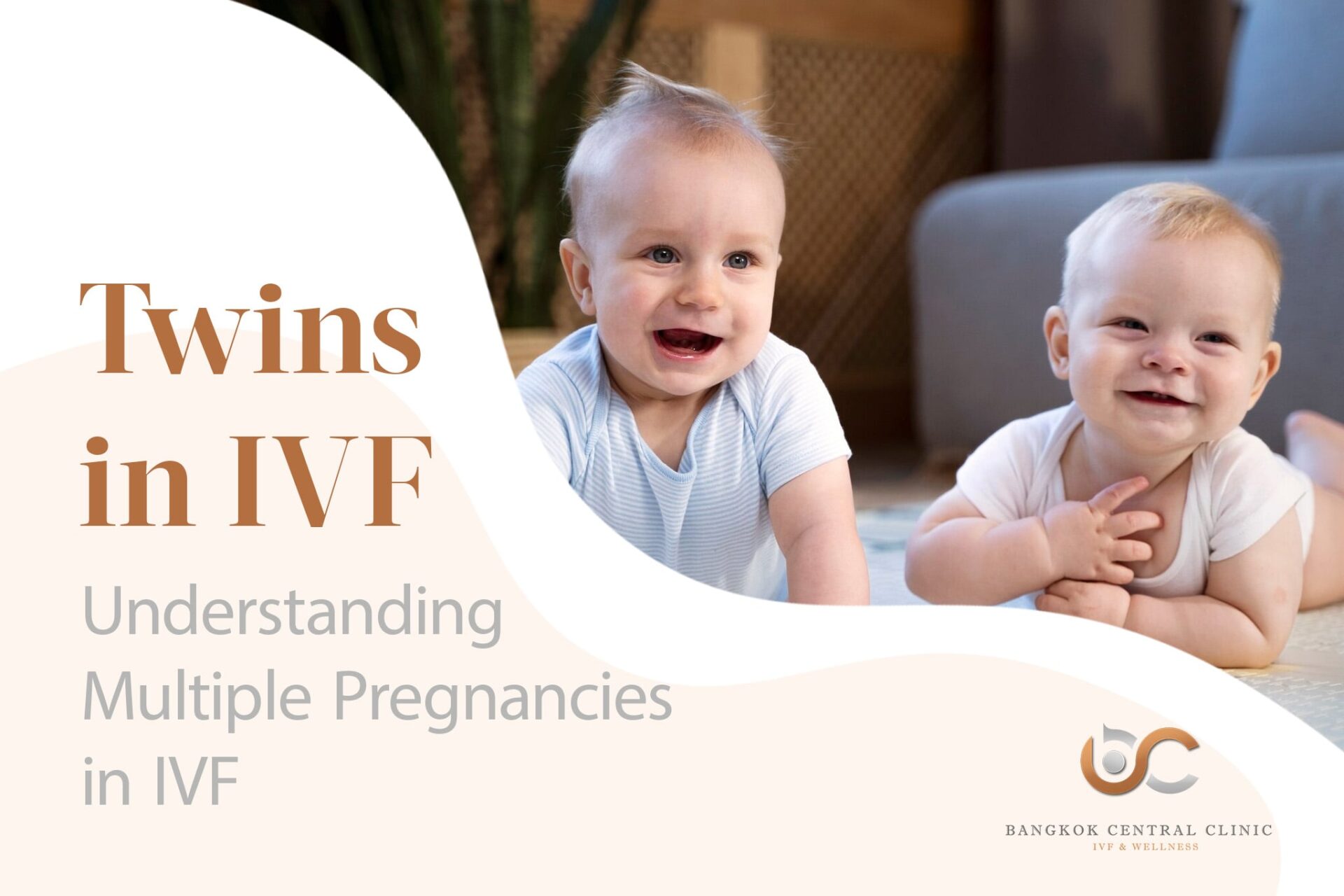HIGHLIGHTS
20 December 2020
5 yoga poses for couples to Enhance your relationship with your partner, level up your happiness in bed.
READ MORE20 December 2020
7 the procedure takes care of yourself and the wife before collecting eggs-collecting sperm.
READ MORE20 December 2020
Protein, a key nutrient of a woman, preparation for pregnancy- preparation for an egg collection.
READ MORE
Why Is It Important for a Health Check Up for Both Male and Female Before Getting Pregnant?
READ MORE
Destination IVF: Why Bangkok is a Premier Choice for International Patients Seeking Fertility Treatment
READ MORETwins in IVF: Understanding Multiple Pregnancies in IVF
 29 Feb 2024
29 Feb 2024

Multiple pregnancies, including twins and even triplets, are a possibility following an in vitro fertilization (IVF) cycle. But what are the real numbers, and how does it happen? To comprehend this, we share our experience on the mechanism of IVF and the nature of twins.
Table of Contents
The Evolution of IVF Practices
The possibility of having multiple births was greatly increased in the past due to IVF methods that consisted of the simultaneous transfer of numerous embryos. However, an important shift has occurred as a result of advances in reproductive technology. Currently, the accepted procedure is to transfer one embryo each IVF cycle, which significantly lowers the likelihood of multiple pregnancies.
More than 30% of in vitro fertilization cycles throughout the mid-1990s produced twins or higher-order multifetal pregnancies. But since then, there have been notable improvements in pregnancy outcomes, especially with regard to twin pregnancies, as a result of important breakthroughs in laboratory procedures and the effectiveness of treatment. By 2019, the rate of twin births has dropped to fewer than 7% of cycles as the field developed and the dangers of multifetal pregnancies became increasingly clear. Technical advancements and revised professional guidelines, such as longer pre-transfer embryo culturing periods, improved freezing technologies, preimplantation genetic testing of embryos, and updated guidelines on the ideal number of embryos to transfer, are largely responsible for this significant improvement.
While the chance of multiple pregnancies is higher with IVF treatment compared to natural conception, the probability remains relatively low, especially concerning more than two babies. Despite past trends, the contemporary approach emphasizes minimizing risks and maximizing the likelihood of a successful, healthy pregnancy.
Mitigating Risks: Strategies for a Safer IVF Journey
Prominent specialists in reproductive medicine support innovative technology such as genetic testing, which is essential for increasing IVF success rates while lowering dangers. Genetic screening makes it possible to identify viable embryos, which makes the selection process more efficient.
There are restrictions on the number of embryos that can be transplanted during IVF operations imposed by regulatory frameworks in different countries. By promoting patient safety and reducing the possible risks connected to multiple pregnancies, these policies hope to strengthen the commitment to ethical reproductive practices.
Multiple births are possible with IVF therapy, but the outcome depends on a number of circumstances. These include the total number of embryos that may be transferred, the specialist’s compliance with regulatory requirements, and the successful implantation of every embryo. Despite the increased incidence of twin births associated with IVF, there is no guarantee of conceiving and delivering twins even with multiple embryo transfers.
Whether opting for a single or multiple embryo transfer, the prospects of successful implantation and a full-term pregnancy depend on various additional considerations:
- Maternal age
- Embryo development status at the time of transfer
- Previous IVF success rates
- Prior natural conception and childbirth experiences
- Underlying causes of infertility
- Lifestyle and health factors affecting the mother
Why Does IVF Often Result in Multiple Pregnancies?
Although many undergoing fertility treatments may find the idea of having twins very appealing, it’s important to understand the hazards involved. The urge to get “two for one” must be weighed against the difficulties and potential consequences that come with having multiple pregnancies.
Mothers who become pregnant more than once are at an increased risk of problems during pregnancy and long-term health issues for their offspring. Carrying multiple pregnancies raises a number of issues, including preeclampsia, gestational diabetes, and premature labor. These concerns highlight the need for careful decision-making during the IVF process.
IVF’s ultimate objective is to create healthy babies while preserving the health of the mother. Individuals may confidently traverse the intricacies of fertility treatments with the help of collaborative care and educated decision-making, all under the common goal of achieving the best possible results.
Empowering Choices, Ensuring Safety
The road to motherhood with IVF is characterized by optimism, fortitude, and the pursuit of a single goal. It is still critical to provide patients with information and assistance as technological developments continue to change the landscape of assisted reproduction. Our team of professionals at our fertility clinic in Thailand collaborates to assist patients achieve their goals and support the formation of healthy families by upholding ethical standards and placing a high priority on patient safety.
FAQ
Q: What are the chances of having multiple pregnancies with IVF?
A: The likelihood of multiple pregnancies, including twins or triplets, is higher with IVF compared to natural conception. However, advancements in reproductive technology and updated practices have significantly reduced the occurrence of multiple births. The current approach emphasizes minimizing risks and maximizing the likelihood of a successful, healthy pregnancy.
Q: How has IVF practice evolved over time regarding multiple pregnancies?
A: In the past, simultaneous transfer of multiple embryos during IVF procedures contributed to a higher rate of multiple births. However, modern practices involve transferring only one embryo per IVF cycle, significantly lowering the risk of multiple pregnancies. Advancements in laboratory procedures, such as extended embryo culturing periods and improved freezing technologies, have further enhanced pregnancy outcomes.
Q: What factors influence the success of IVF treatments in avoiding multiple pregnancies?
A: The success of IVF treatments in avoiding multiple pregnancies depends on various factors. These include adherence to regulatory guidelines regarding the number of embryos permitted for transfer, the specialist’s compliance with legal limits, and the successful implantation of embryos. Additionally, individual factors such as maternal age, embryo development status, and underlying causes of infertility play significant roles.
Q: Are there risks associated with multiple pregnancies from IVF?
A: Yes, multiple pregnancies pose increased risks for both mothers and babies, including pregnancy complications such as preeclampsia, gestational diabetes, and premature labor. Long-term health issues for offspring, such as low birth weight and developmental delays, may also arise. It’s essential to weigh the potential benefits and risks carefully when considering IVF treatment.
HIGHLIGHTS
20 December 2020
5 yoga poses for couples to Enhance your relationship with your partner, level up your happiness in bed.
READ MORE20 December 2020
7 the procedure takes care of yourself and the wife before collecting eggs-collecting sperm.
READ MORE20 December 2020
Protein, a key nutrient of a woman, preparation for pregnancy- preparation for an egg collection.
READ MORE
Why Is It Important for a Health Check Up for Both Male and Female Before Getting Pregnant?
READ MORE


















